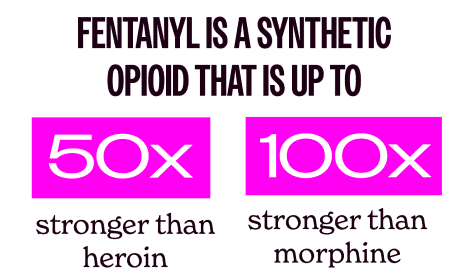Fentanyl is a synthetic opioid that is up to 50 times stronger than heroin and 100 times stronger than morphine. It is a major contributor to fatal and nonfatal overdoses in the U.S.


There are two types of fentanyl: pharmaceutical fentanyl and illicitly manufactured fentanyl. Both are considered synthetic opioids. Pharmaceutical fentanyl is prescribed by doctors to treat severe pain, especially after surgery and for advanced-stage cancer. It is prescribed in the form of transdermal patches or lozenges and can be diverted for misuse and abuse in the United States.
However, recent cases of accidental overdose deaths in the U.S. are linked to illicitly manufactured fentanyl. It is sold through illegal drug markets for its heroin-like effect. Fentanyl is being used to mix or cut many types of substances like counterfeit pills, heroin, cocaine, methamphetamine, marijuana and more. Fentanyl is easy to transport and makes drugs cheaper, more powerful, more addictive, and more dangerous.
It’s dangerous
The issue is when fentanyl is mixed improperly or unevenly with the other substances. Fentanyl is so strong that even a minor miscalculation can be fatal. A mere 2 mg of fentanyl, about a grain of sand, is a potentially lethal dose. It can be different for everyone. There are a variety of factors in the exact dosage, including tolerance, that might be fine for one person and cause an accidental overdose death in another. In 2020, more than 92,000 overdoses resulted in death. Most of which were caused by opioids, as well as counterfeit opioids such as Fentanyl.
Expect fentanyl & always test first
The truth is, most people have no idea whether or not their drugs contain fentanyl. You can’t smell or taste fentanyl. The only way to determine a substance contains fentanyl is by testing for it. And since most interactions with fentanyl are accidental, most people are not prepared for a potential overdose. Test strips are inexpensive and typically give results within 5 minutes, which can be the difference between life or death.
One portion of a drug may contain fentanyl, while another portion may not.
How to use a Fentanyl test strip
Video Instructions
You can use any small container (little ketchup cups work well). Whatever container you use, only use about a half (1/2) a shot glass of water (15mL). If you are testing a stimulant (like meth, cocaine, or MDMA) use a full shot glass of water instead.
About the size of a match head or half a grain of rice.
How do I use the strip?
1
Put the powder in the glass of water and swirl it until it is completely dissolved. If you want to test something that isn’t a powder, crush it first.
2
Hold the solid blue end of the test strip and dip the other end in the water. Keep the water below the blue line.
3
Hold the strip in the water for about ten seconds. You will know it’s ready because the water will be sucked up into the white part of the strip.
Take the strip out of the water and wait sixty (60) seconds.
5
Use a bright light to look at the strip and count how many red lines there are. Even very light red lines count!
6
Make sure you check the strip within ten minutes of doing the test. Throw the strip away when you are done.